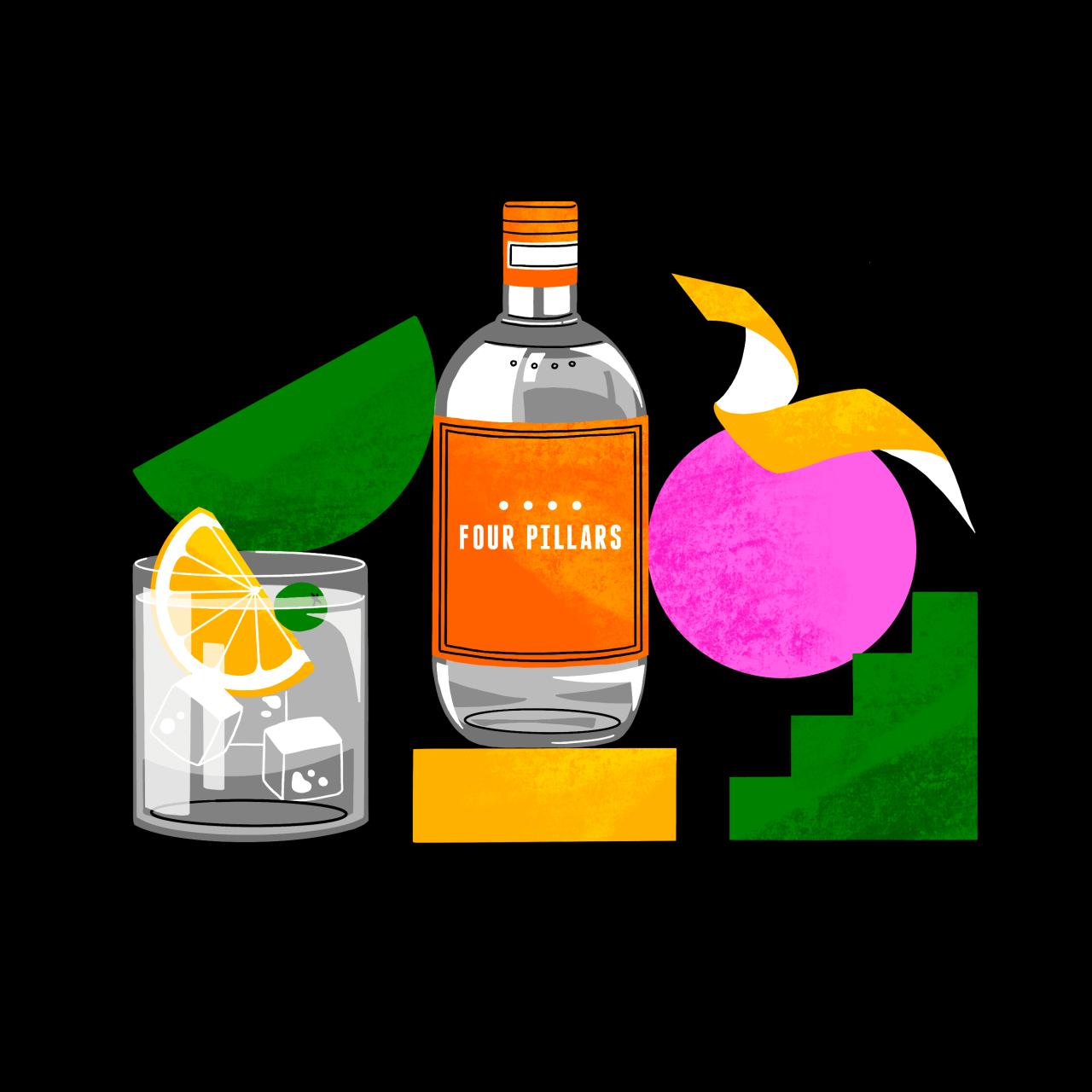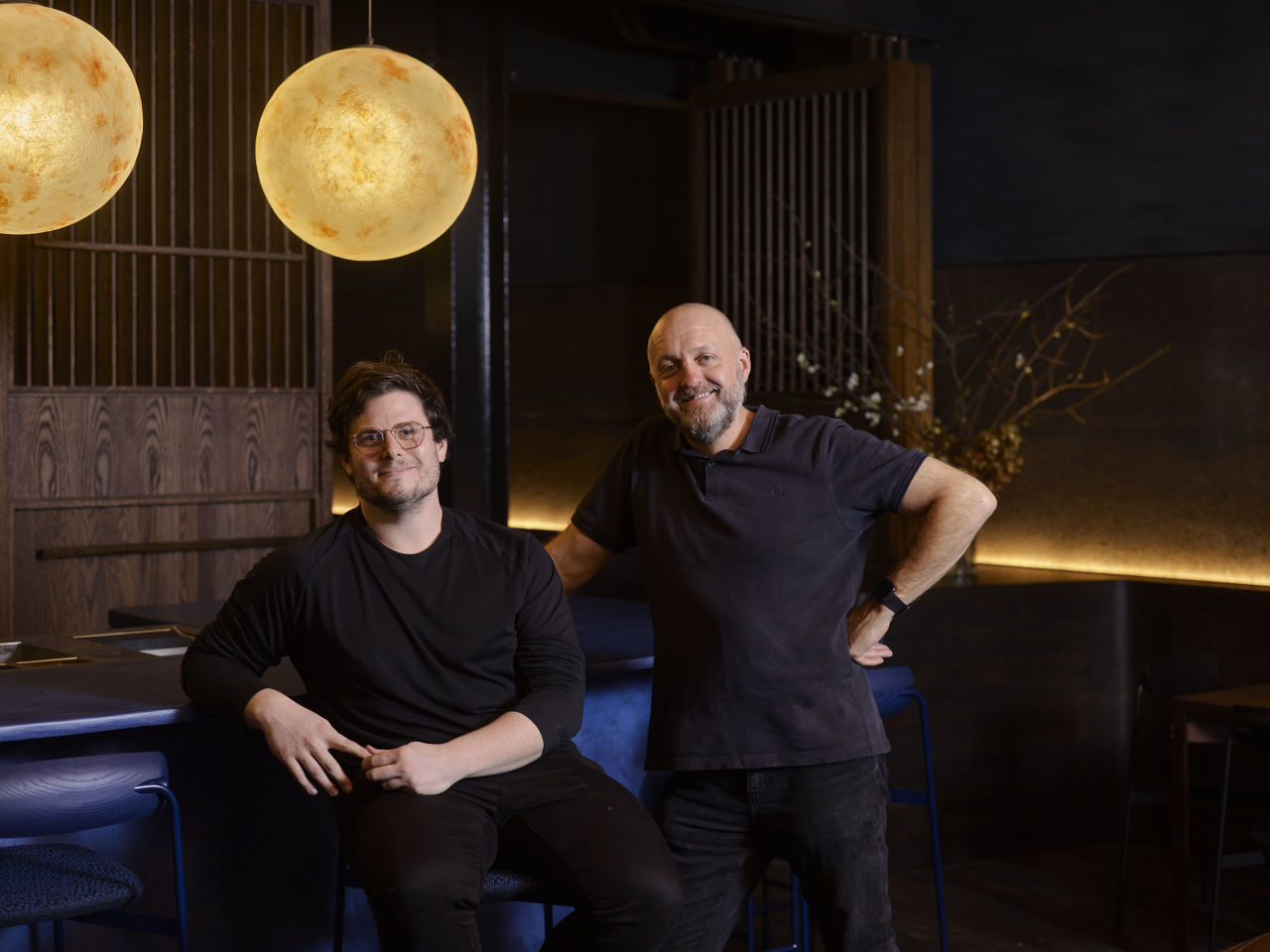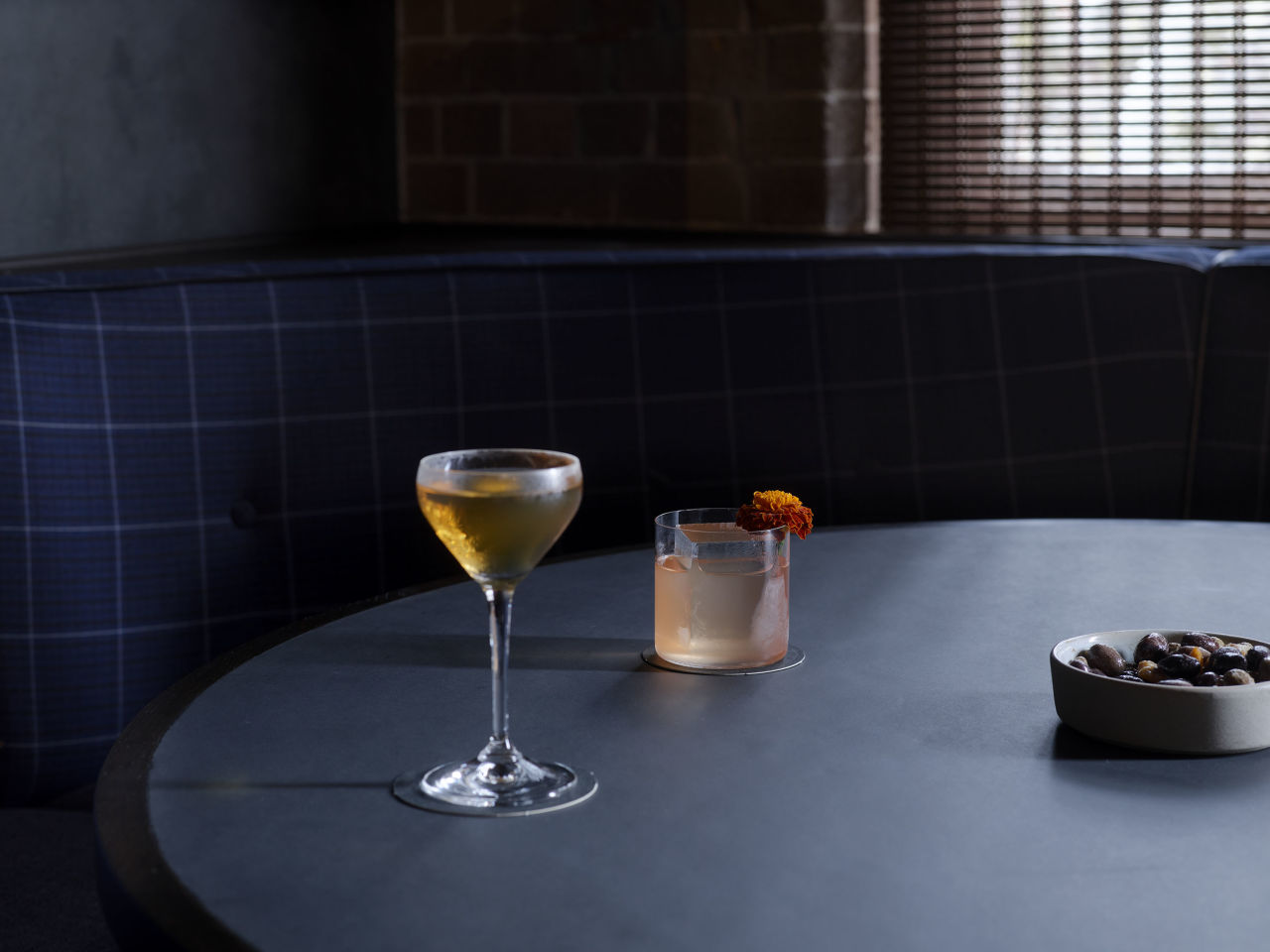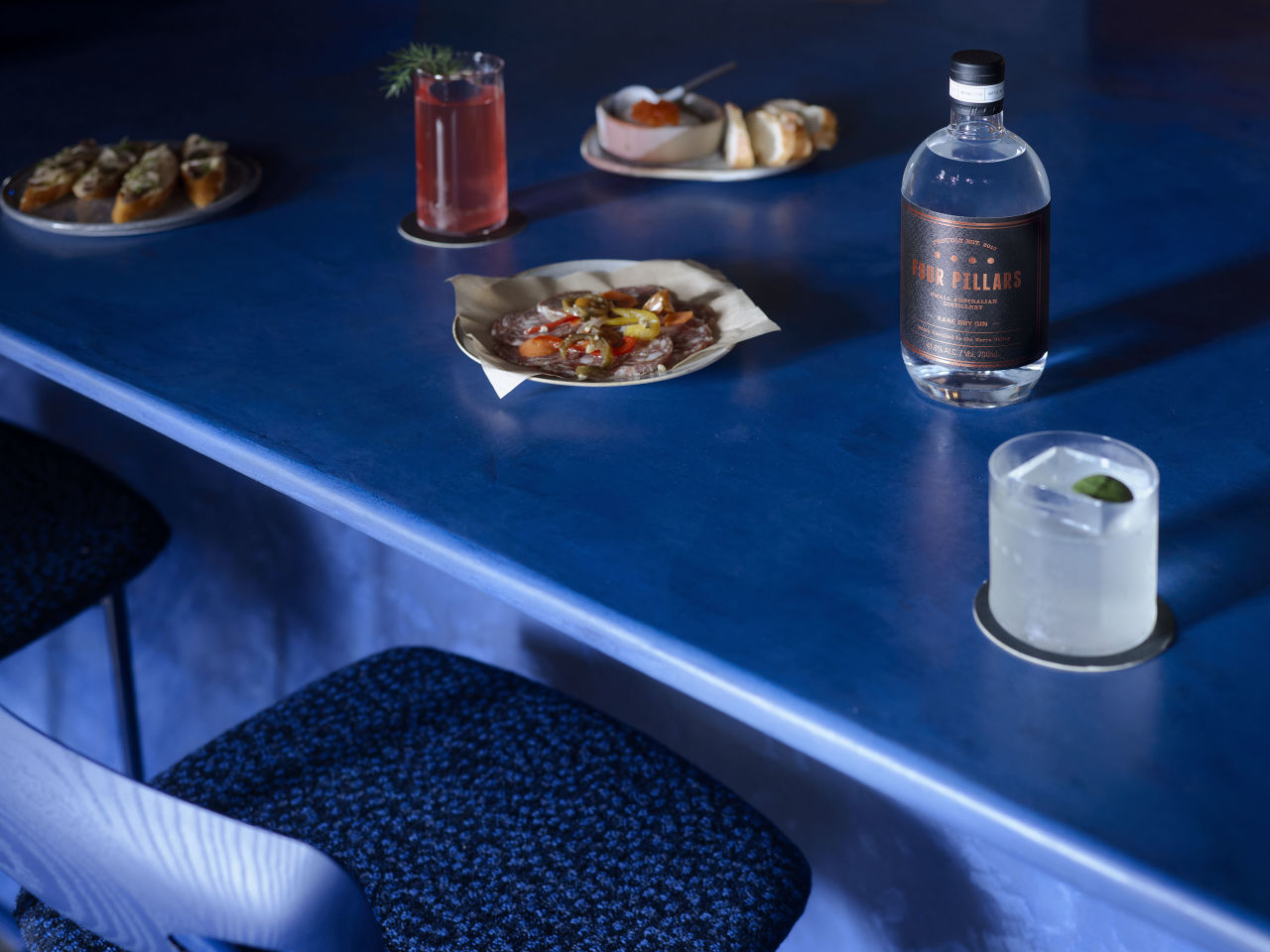The secret behind Four Pillars’ world-beating title

Four Pillars by Lisa Nguyen
“You can’t run a successful business of any description if you’re not customer-focused,” Stuart Gregor, Co-Founder, Trade Director, and Chief Ambassador for Four Pillars, begins.
We’re sitting in the newest addition to the brand’s brick and mortar offerings, the Four Pillars Gin Lab in Sydney’s Surry Hills. The bar is quiet, refined. Elegant but unpretentious. Gregor is doing what he does best—talking about gin.
A PR man, journo, booze dude, MC, auctioneer, and business and marketing gun—if it involves raconteuring or alcohol, Gregor seems poised to take it on. His CV is an eclectic mix of wine-making, alcohol writing, the odd not-for-profit involvement, and lifestyle public relations (he founded Liquid Ideas, one of Australia’s most successful lifestyle PR firms in 2000, only stepping back from a leadership role in 2017). To put it in simple terms: Gregor has been talking and drinking professionally for 20 years.
Despite the long list of bona fides before his name and Four Pillars’ stellar performance over the past seven years, Gregor isn’t what you would expect from a highly successful business owner. He’s far more entertaining, for one, possessing a good-humored patter that naturally draws others into his often hilarious, often insightful, often strange world (he spent a few minutes explaining the innovation of Cottonelle toilet paper—one durable ply, as opposed to multiple, pressed plies—“genius,” he remarked, only to then jump into a quick-fire dissertation on his fondness for anchovies). There is a Boomer jocularity to him recognizable in uncles at a Christmas party after the third or fourth beer, telling tall tales of yesteryear. And no matter how much he may find himself at the center of attention, there’s little apparent need on his part to be there. He rolls out line after line of storytelling gold, simply for the love of it.
Gregor’s Four Pillars story started in 2013 with a copper still called Wilma, named after co-founder Cameron Mackenzie’s late mother. After that, a distillery was founded in Healesville, tucked away in Victoria’s Yarra Valley. Here, along with his two co-founders, they launched what would soon become one of the biggest Australian food and beverage success stories of the past ten years.
From a little Aussie distillery on the outskirts of Melbourne to winning the most sought after prize in the world of booze—International Gin Producer of the Year in the International Wine and Spirits Competition, the alcohol equivalent of taking out Best Film at the Oscars—Four Pillars’ journey is built on a solid foundation of product and customer obsession, and is one any aspiring founder should look to understand.

Stuart Gregor (right) and the Four Pillars Gin Lab, Surry Hills, Sydney.
Gin-ovate the market
In terms of Four Pillars’ offerings, the usual hallmarks of quality are ever-present—fresh, locally sourced ingredients, cutting-edge processes, and clear-headed dedication to the craft and its results. But where Gregor and his co-founders’ genuinely excel is in their willingness to experiment and innovate—bringing to life a huge variety of unique gins to accommodate even the most fickle of palates.
One of Four Pillars’ most well-known competitors, Hendricks, is famous for its market penetration with a single flagship product. “You either like it, or you don’t, but that’s the only one they’re going to make for you,” chimes Gregor. “What we do, unlike some companies, particularly in the past, is we don’t try to tell everyone they should like one product. We started on a totally different plane, which was to make lots of different gins. And you’re going to like one of them. You might like the one with the olives. You might like the one with Shiraz. You might like the one with the barrel aging. You might like the one with the exotic botanicals—but we’re going to make you a suite of gins.”
In this way, developing their market has undoubtedly contributed to Four Pillars’ success, helping them unlock previously untapped segments of gin drinkers. But it’s what he says next that catches me off guard. While many would argue that significant product testing and market validation is important when developing a commercial strategy, Gregor and co are far more cavalier. “There was no latent desire or need for an Australian gin, right?” he ventured. “If you’d gone to 20 bartenders and said, what are you missing behind your bar? Not one of them would have said an Australian gin. We would’ve walked back and thought, ‘Well, why would we make an Australian gin?”
“You have to back yourself to some degree to make a product. The people don’t know they need it until they taste something.”
Gin-credible customer experience
A top-shelf product, the right price point, and all the market knowledge available is all well and good, but it isn’t enough to make you a world champion. Gregor shares his insight into how deep customer understanding has helped him develop a customer experience worthy of taking home the title. “Once you’re a brand and you’re a product—once you’re real—that’s when customer feedback becomes everything,” says the gin man. “From the product, hospitality, experience, website—all of the elements of our business—the customer gives us so much feedback. And our job is to listen, adapt, and to always respond.”
“That’s the primary and fundamental goal of all businesses; the better you understand your customers, the more you’re able to figure out what a customer wants,” he says, cautiously tending to a large glass of green tea in front of him. “And that is no different, whether they want a piece of software from Dovetail or they want a beautiful gin experience at Four Pillars.”
For all the proclamations organizations and their leaders make around customer obsession, it’s still easy at times to forget there’s a human on the other side of the product. But Gregor, the PR, and marketing man and hospitality industry veteran, has worked at the coalface of customer experience for two decades. This is probably why Rick Baker, Co-Founder of Australian VC company Blackbird Ventures, invited Gregor to talk at his organization. “I had Rick in here only two nights ago. We were talking about the similarities between his business and ours, and how he wants to teach his business the skills that we have in hospitality,” Gregor chirps.
“There’s a lot that can be learned from each other. There are so many core fundamentals that are the same, regardless if somebody is selling software or gin.”
Gregor is building up steam now, his rapid-fire verbal style filling the room. There’s a gleam in his eye as he drops wisdom with the energy of a 40-megaton bomb. “If you are an arrogant, dismissive, conceited, up yourself, fuckwit business, you’re going to go out of business, doesn’t matter who you are,” Gregor opines. “If you are a generous, thoughtful, considerate, hardworking, honest, and diligent business, you will fucking succeed. Right? And that’s the truth for the Dolphin Hotel as it is for the goddamned Atlassian boys, as it is for Blackbird and Four Pillars.” Despite the colorful language, Gregor is deadly serious. And he’s not wrong, either.

Cocktails by Four Pillars.
The gins and outs of customer obsession
Customer experience is increasingly one of the most critical areas for businesses to gain a competitive advantage, a fact not lost in the broader business community.
Global research advisory firm Gartner revealed that in 2019, more than 50 percent of organizations had redirected their investments to customer experience innovations.
The rewards are there. According to a Forrester study in 2016, customer-obsessed businesses are seven times more relevant to customers and five times more likely to be a top provider of products, and four times more profitable. According to Temkin Group, even a moderate improvement in CX would impact the revenue of a typical $1 billion company by an average of $775 million over three years.
There’s no secret ingredient in the Four Pillars’ mix. For them, becoming customer-focused is about sweating the details and making organizational and cultural shifts that place the needs of human beings first. During our conversation, Gregor is more than willing to share what he’s learned about running a world-class, customer-obsessed business. For example:
- Put the customer experience front of mind. “First of all, try to figure out things that people are gonna really genuinely love, and then deliver it.”
- Bad experiences have an outsized impact on your business. “People come here and have one bad buyer experience. They’re very inclined to tell others about it.”
- Find ways to deliver fantastic customer service, no matter where in their journey your customer is. “You always want to make the first ones feel special, but you also don’t want someone to feel like they’ve missed out if they only joined the Four Pillars family last week.”
- The importance of your team and integrating customer understanding on every level of the business. “It’s about maintaining that culture within the organization, such that everyone feels a special place within the business.”
- The experience has to be authentic and true to the brand. “The days of glossy smoke-and-mirrors type experiences are well behind us. Be transparent about the process and the commitment to the craft.”
- Make it easy and fun. “People don’t want complicated and boring. That’s Life in 2020 – brands like ours need to make interactions simple and fun.”
- Be honest, and say thank you. “If you stuff up, apologize. If you can’t do something, don’t promise it in the first place.”
- Don’t take good customers for granted. “Always ensure the most loyal get the best offers, the newest and shiniest gin toys. Even if it’s only a day before the rest of the world, they appreciate it.”

Food and bev by Four Pillars.
Just the be-gin-ing for Four Pillars
Notwithstanding a certain viral pandemic, the Healesville distillery in Victoria expects to see a surge of visitors coming from all parts of the world to try the number one gin. Gregor admits the pressure is on. “Every one of those new customers is going to come with increased expectations because now they think we’re famous. Now they’re walking into the bar saying, ‘I’m going to have the world’s best gin experience.’ That’s a much higher bar,” he confides. But then again, bars are precisely what Gregor and co are so good at. And with brewing giant Lion Nathan having bought a 50 percent share in the company just last year, Four Pillars gin is set to explode at home and across the globe. (Knocking Hendricks off as Australia’s highest-selling premium gin is the first item on the list, says Gregor).
As for Wilma, that little still in Victoria’s Yarra Valley? Now she’s joined by a few more copper friends: Jude, Eileen, Beth, and Coral. All named after the founders’ mothers.
Subscribe to Outlier
Juicy, inspiring content for product-obsessed people. Brought to you by Dovetail.